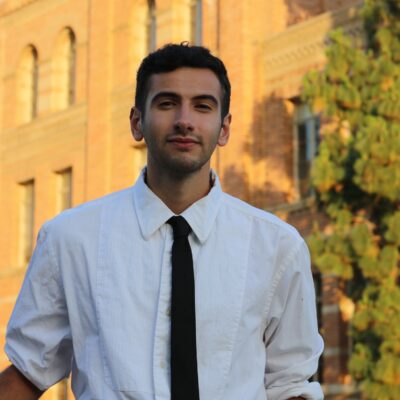Student Spotlight: Jeremy Peschard Pórtela

November 25, 2024
Jeremy Peschard Pórtela is a doctoral candidate in history from the San Francisco Bay area. He earned his bachelor of arts at UCLA and now studies the histories of Latinos, immigration, and mental health under the guidance of Maria Cristina Garcia at Cornell.
What is your area of research and why is it important?
I study the histories of Latinos, immigration, and mental health. In 1882, the U.S. Congress passed one of the nation’s first ever federal immigration laws, barring people with physical or mental disabilities from entering the U.S. Around the same time, states constructed psychiatric asylums to hold individuals believed to be “insane.” My research examines the institutionalization of immigrants with mental illness in state asylums, as well as federal measures both to prevent their entry at the border and later to deport them. This history is salient because it’s part of a long tradition in U.S. history of connecting immigrants to sickness and claiming they are financially dependent on the state.
What are the larger implications of this research?
This research explains broad patterns in U.S. history, including the criminalization of mental illness and the formation of the nation’s federal deportation system. My work also has implications for contemporary discussions about mental health and immigration. In the U.S. today, local and state governments are proposing involuntary hospitalization to address mental health crises among their unhoused populations. High-level federal politicians, meanwhile, are raising anti-immigrant fears by falsely claiming immigrants are coming into the U.S. from jails and “insane asylums.” My research shows that neither of these ideas are original, but rather have deep roots in U.S. history.
You were awarded a Berkeley Latino Social Science Predoctoral Fellowship. What has this experience allowed you to do?
As a 2024-2025 U.C. Berkeley Latino Social Science Initiative fellow, I will participate in colloquiums focused on cutting-edge research in the social sciences that pertain to Latinos. Furthermore, I will participate in the Initiatives’ Community Partnerships Program, which aims to connect researchers working on topics related to Latinos with community organizations that are working on the same issue. Finally, as part of this fellowship, I was awarded a travel research stipend, which will allow me to go to archives in Los Angeles and Texas to answer some final research questions as I prepare to defend my dissertation in spring 2025.
You created and were an instructor for a first-year writing seminar last year. Can you speak about participating in the Knight Writing Institute’s training for teaching writing?
I developed and taught the course “Race and Medicine in U.S. History” through the Knight Writing Institute. Instructors who teach first-year writing seminars are enrolled in a pedagogical training course over the summer. During this training, we learn how to teach a class from scratch. This includes crafting a syllabus, planning in-class activities, and writing essay prompts. I had already served as a teaching assistant for several semesters, but spending six dedicated weeks learning how to be a course instructor was a matchless opportunity. Because of Knight’s training, I went to class on day one knowing exactly what to do.
What are your hobbies or interests outside of your research or scholarship?
I’m a big fan of the National Park system. This summer, my partner and I visited the Great Smoky Mountains, Yosemite, and Kings Canyon National Parks for the first time. I also enjoy biking, going to music festivals, and eating out with friends.
Why did you choose Cornell to pursue your degree?
I chose Cornell for two reasons. I wanted to work with my dissertation advisor, Maria Cristina Garcia, who is one of the country’s leading Latino historians and genuinely one of the most wonderful people I’ve met. Working as her Ph.D. student has been a joy and has made me a better writer, researcher, and scholar. Secondly, I chose Cornell because of the resources which it provides its students. I’m a first-generation college student, so I am grateful to have been given access to opportunities that I never could have imagined or thought possible when I first started this program.
